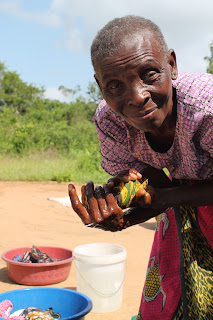Taking the baby out the house
This is a short account of my weekend at my friend's shamba (small holding farm) in Jilore north of Arabuko-Sokoke forest. There's three parts which I wrote at different points throughout the day.
Evening of the 9th
I'm sitting in a shamba near Jilore surrounded by half a dozen kids who are reading every word I write. At the same time cheesy gospel reggae is booming out over the stereo hooked up to a generator. The kids are singing along religiously. Its very cute, but quite strange.
(After this they started drawing in my diary for a while)
Morning of the 10th
I'm currently sitting in the shamba of my friend Mathias from Mwamba. He's just gutted a great a goat to celebrate his baby's 1 month old “coming out of the house” ceremony. When he first invited me to this party I asked, “So you mean the baby hasn't left the house yet?” He just looked at me like I was crazy, why would anyone take the baby out before!? I then tried to ask if there was any significance of taking the baby out, if there was any ceremony. “We roast goat, then relax” So here I am anyway and we'll see if there's anything more to understand.
The generator stereo played until 1 or 2 last night and five of the men in the family finished a demi-john of the potent home made palm wine. If any of you remember the cider I made one year at university it was like that but worse! I politely refused and tried to sleep through the noise
Back at Mwamba on the 11th
In the end the baby was gently carried out and passed between different women in the family. Although there was no ceremony as such, it was a gentle moment of silence as the baby came out.
A little lesson on Giryama hospitality. As you get within eyesight of the house you are going to people run to meet you and your bags are taken and carried for you. Even my water bottle in my hand was fought over by two kids to decide who got to carry it. When you arrive at the homestead someone will carry a chair for you to sit on under a tree and if there's no chair free someone will sit on the floor and give you theirs. After that someone will serve you chai without asking, it's expected, and if for some reason you don't want any or have had enough you leave it and someone will silently remove it. At meals everything is served to where you sit; food water, sauces etc. Before and after the meal a girl will carry a jug of water and a bowl over which you hold your hands as she pours the water so you can wash them. Even because I was there over night I took a spare t-shirt and kikoi for using as a towel. In the morning an old lady had washed these for me and hung them to dry.
It was a very peaceful day. Mostly sitting or lying on a mat under a tree from the cool of the morning to the intense heat of the afternoon. The pace is so relaxed that you have time to watch everything, from how the mama was squeezing clothes for washing, to the gentle flutter of acacia leaves caught in a breeze, to the flowing chatter of people talking in Giryama. It was also special because it really was a family event, where everyone, whether they work in Mombasa, Malindi or Watamu returned to the family farm. It definitely had that character of togetherness which reminded me of our extended family when we gather. In addition it had the timelessness typical of rural African settings, both historically and literally. As I was getting ready to leave I asked out of interest what time it was. The only person with a phone on them merely replied, “Sorry, I haven't set it”. So I left on a motorbike at some point with someone, who drove around an hour to drop me home, only to return to the party, where life goes on with the unhurried rhythms of days, seasons and generations.
 |
| Matthias, his wife and his baby Rich |
 |
| Sunrise over Sabaki river |
 |
| Gutting the goat, starting with the testicles |
 |
| Washing clothes |
 |
| Sifting the rice |
 |
 |
| The big moment |
 |
| The baby is out! |




Really loves this story - as much of this as you can please :) And your photos are wonderful. x
ReplyDelete